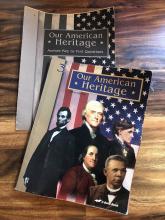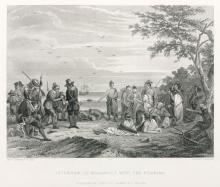Textbooks

WHEN DID YOU realize your textbooks lied to you?
I grew up in the Pacific Northwest and was homeschooled by my mother, the wife of a conservative Christian pastor. I didn’t think too much about my education until the 2016 election when I became increasingly alarmed by the enthusiastic support white evangelicals gave to Donald Trump. When Trump ascended into office, riding in on the phrase “Make America Great Again,” my memory was pricked. I had heard all this before.
To check it out, I obtained two history textbooks that I had used growing up. In 1999, when I was a sophomore in high school, 1.7 percent of the U.S. population was homeschooled. By 2012, the percentage had doubled. When I was homeschooled, there were three prominent curriculum producers for Christian homeschooling: Abeka Press, Bob Jones University Press, and Accelerated Christian Education. Abeka remains the most popular. Officials at Abeka, according to the Orlando Sentinel, would not say how many textbooks the company sells or release the number of schools that use their curriculum, but said that “it is safe to say that millions of students” have used the materials.

In the Hebrew and Christian scriptures, there is a Psalm that proclaims: “the earth is the Lord’s and everything in it, the world, and all who live in it” (Psalm 24:1). There is no part of this world that God is not aware of, cannot lay claim to, and does not rule. Christians affirm that as people of faith we’re called to be stewards over creation, answering one day for how we’ve treated the earth.
And part of that stewardship means understanding how this world works and what it needs in order to thrive. Unfortunately the din of our political ideologies has too often drowned out the biblical calling to care for creation.
In Texas, the State Board of Education will recommend new textbooks for all its students—and because it has such a large population, what they decide could determine what students in other states learn about science. There are several ideologues submitting textbook critiques to the board and their reviews will factor into each book’s overall score and likelihood of being approved by the school board. These ideologues could block the use of textbooks that teach the reality of climate change for the whole country’s public school students.

"The antidote to feel-good history is not feel-bad history but honest and inclusive history." – James Loewen, Lies My Teacher Told Me, 92.
It’s becoming increasingly difficult for Americans to celebrate Thanksgiving. This Thanksgiving, as we take turns around the dinner table sharing why we are thankful, a sense of awkwardness settles in. The awkwardness is not only due to the “forced family fun” of having to quickly think of something profound to be thankful for. (Oh, the pressure!) The growing awkwardness surrounding Thanksgiving stems from the fact that we know that at the table with us are the shadows of victims waiting to be heard.
Humans have an unfortunate characteristic – we don’t want to hear the voice of our victims. We don’t want to see the pain we’ve caused, so we silence the voice of our victims. The anthropologist Rene Girard calls this silencing myth. Myth comes from the Greek worth mythos. The root word, my, means “to close” or “to keep secret.” The American ritual of Thanksgiving has been based on a myth that closes the mouths of Native Americans and keeps their suffering a secret.
Thank you for the recent John Fea essay ("Those Who Will Not Learn from History," May 2010) on the educational lunacy going on in Texas.
Like it or not, the far-Right members of the Texas State Board of Education may have already decided what your children will learn about American history.